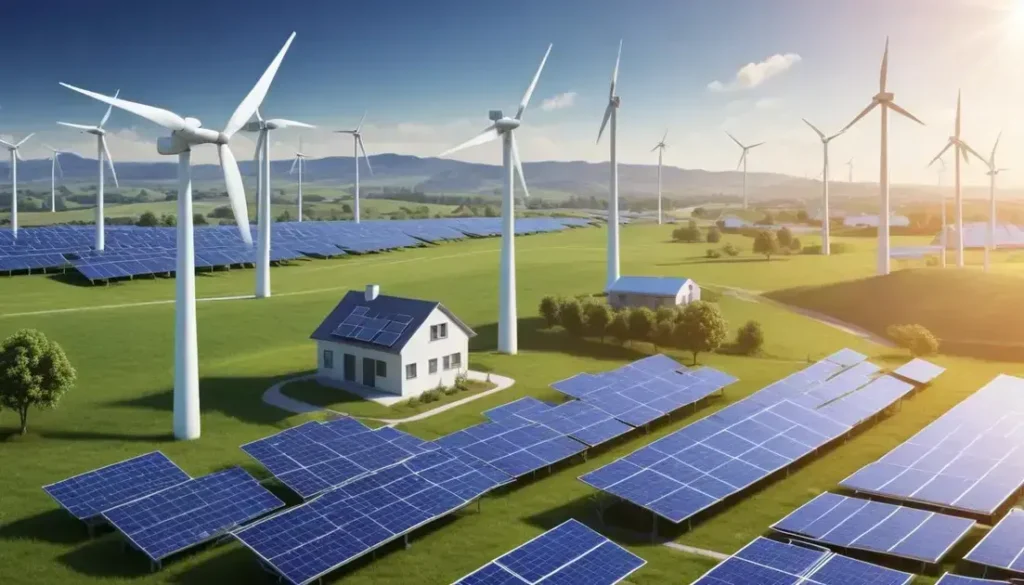The Spanish blackout highlights critical vulnerabilities in energy systems, emphasizing the need for a balanced energy mix of renewable and traditional sources to ensure stability and prevent future disruptions.
The recent Spanish blackout has raised significant questions about energy reliability and its implications for businesses around the globe. Let’s decode its impact.
Understanding the Spanish Blackout: An Overview
The Spanish blackout was a significant event that captured the attention of many, raising concerns over energy reliability. The incident occurred due to a combination of factors, including sudden demand surges and unexpected outages in renewable energy sources. This event not only affected day-to-day life in Spain but also had immediate repercussions beyond its borders.
In the wake of this blackout, energy experts have highlighted the need for a more resilient infrastructure. Traditional energy sources, such as gas and hydro, have become essential partners for renewables, especially during peak demand periods. The integration of renewable energy must be balanced with reliable backup systems to prevent future incidents.
The event has instigated discussions about energy policies, pushing the government to consider reforms that would enhance the stability of the national grid. Furthermore, it serves as a wake-up call for other countries, particularly in the UK, to re-evaluate their own energy strategies amid increasing reliance on renewable sources. Ensuring that the energy supply remains consistent and secure is vital in today’s climate-conscious world.
As other nations observe Spain’s response to this crisis, the lessons learned could shape future energy policies globally. This may lead to improved frameworks, promoting sustainability without compromising on energy security.
Factors Leading to the Blackout
Several critical factors contributed to the recent blackout in Spain, showcasing the vulnerabilities inherent in modern energy systems. One major issue was the unexpected surge in demand during peak hours, significantly outpacing the available energy supply. This imbalance highlighted the need for an adaptable energy model that can respond swiftly to fluctuations.
Another significant factor was the dependence on renewable sources like wind and solar power. While these energy sources are crucial for sustainability, they can also be unpredictable due to changes in weather conditions. For instance, a lack of wind can drastically reduce energy output during times of high demand, exacerbating supply issues.
Moreover, aging infrastructure compounded the problem. Many networks are not equipped to handle sudden changes in energy demand or supply. This inadequacy points to the necessity for investments in modernising energy grids to improve resilience against such crises.
The combination of these elements underscores the importance of creating a balanced energy portfolio. By diversifying energy sources and enhancing infrastructure, future blackouts can be mitigated, ensuring a reliable energy supply for both households and businesses.
Role of Renewables and Traditional Energy
The interplay between renewable energy sources and traditional energy has become a focal point in energy discussions, particularly following the Spanish blackout. Renewable energy, such as wind and solar, offers significant benefits, including sustainability and reduced carbon emissions. However, their reliance on natural conditions makes them less predictable.
During periods of high demand, traditional energy sources, like natural gas and coal, provide the necessary backup to maintain a stable energy supply. This balance is crucial, as increased reliance on renewables without adequate support from traditional sources can lead to energy shortages and outages.
Moreover, integrating renewables into the energy mix requires sophisticated management and innovative solutions. Energy storage technologies, such as batteries, play a vital role in capturing excess energy produced during the day for use during peak demand hours. By investing in both renewable and traditional energies, countries can ensure a more resilient energy infrastructure.
The combined efforts to harness the best of both worlds not only contribute to energy security but also advance national goals for sustainability. Striking the right balance is essential for creating a robust and efficient energy system that can withstand unexpected challenges and fluctuations in demand.
Government’s Response to the Outage
The government’s response to the recent blackout in Spain has been swift and multifaceted, aimed at addressing both immediate concerns and long-term energy strategies. Following the blackout, officials convened to assess the situation and outline a series of measures to prevent future incidents. One of the initial steps included a thorough investigation to identify the root causes of the outage.
In addition, the government has proposed increased investment in renewable energy infrastructure. This includes enhancing the capability of the grid to manage fluctuations in energy supply and demand more effectively. Strengthening connections between renewable sources and traditional power generation systems is also a priority.
Moreover, authorities are focusing on updating regulations surrounding energy production and distribution. This regulatory reform is intended to promote innovation and resilience, ensuring that energy providers can better cope with unexpected surges in demand or supply disruptions. Emergency protocols are being reviewed and restructured to enhance the response capacity during crises.
Public communication is also a key component of the response strategy. The government has committed to keeping citizens informed about developments and future energy plans, fostering a transparent dialogue with the public to rebuild trust following the blackout.
Impact on Industry and Infrastructure
The impact of the recent blackout in Spain on industry and infrastructure has been profound and far-reaching. Many sectors experienced significant disruptions, particularly those reliant on constant energy supply, such as manufacturing and technology. Factories and production lines were halted, leading to potential revenue losses and delayed timelines on projects.
Infrastructure systems, including transportation and communication networks, also faced challenges. Traffic lights failed, causing chaos on the roads, while telecommunications systems experienced outages, hindering both business operations and daily life. This incident has highlighted the fragility of existing infrastructure in the face of increasing energy demands.
In response to these challenges, businesses are being prompted to reassess their energy strategies. Companies are exploring options like investing in energy storage solutions and diversifying their energy sources to enhance resilience. Moreover, industries are increasingly recognising the importance of integrating renewable sources with backup systems to secure their operations.
The blackout serves as a crucial reminder of the need for robust infrastructure that can withstand unexpected disruptions. Future investments must focus on modernising energy systems to ensure reliability and sustainability, thereby protecting both industry and public services from similar events in the future.
Lessons for UK Energy Policy
The recent blackout in Spain has provided several important lessons for UK energy policy, highlighting areas that require immediate attention and reform. One key takeaway is the necessity for a balanced energy mix. Relying heavily on renewable sources without sufficient backup from traditional energy can lead to vulnerabilities. The UK must ensure a robust combination of energy types to maintain stability.
Another critical lesson is the importance of infrastructure upgrades. The incident demonstrated how outdated energy systems can exacerbate crises during peak demand times. Investing in modernising the grid and integrating advanced technologies will enhance resilience against unexpected fluctuations.
Moreover, robust regulatory frameworks must be established to encourage innovation and investment in clean energy solutions. Policies that promote both renewable energy and traditional methods are crucial for fostering a secure energy future. The government can use this opportunity to encourage private sector involvement and partnership in energy projects.
Lastly, public awareness and community engagement are vital components of any successful energy policy. Educating consumers about energy conservation and sustainability measures can lead to significant demand management. Ultimately, the lessons learned from the Spanish blackout can guide UK policymakers in creating a more secure, resilient, and sustainable energy landscape.
Future of Renewable Energy in Europe
The future of renewable energy in Europe appears to be promising, driven by ambitious policies and a growing commitment to sustainability. Many European countries are setting ambitious targets to reduce carbon emissions, aiming for net-zero by 2050. This shift is prompting rapid investments in clean energy technologies such as wind, solar, and hydroelectric power.
One significant trend is the increasing efficiency of renewable technologies. Advances in energy storage solutions, such as batteries, are enabling better integration of intermittent sources like solar and wind into the energy grid. This progress will help meet energy demand even during low production periods.
Additionally, collaborative efforts among European nations are enhancing energy security. Initiatives such as cross-border energy grids and shared renewable projects are enabling countries to optimise their energy resources effectively. This collaborative approach can lead to more stable prices and reliable energy supplies across the continent.
The outlook also includes a stronger emphasis on innovation and research. Investments in new technologies, including energy efficiency improvements and smart grid solutions, are essential for ensuring a sustainable and resilient energy future. Overall, the landscape for renewable energy in Europe is evolving rapidly, positioning the continent as a leader in the global transition toward clean energy.
International Relations and Energy Stability
International relations play a crucial role in energy stability, significantly influencing how countries manage their energy resources. As nations strive for energy independence, strategic partnerships are formed to secure reliable energy supplies. Countries typically engage in agreements to import and export energy, which are essential for maintaining stability in their energy markets.
Geopolitical tensions can disrupt energy flows, making it vital for nations to diversify their energy sources. For example, the reliance on a single country for oil or gas supplies can make nations vulnerable to political changes. Therefore, fostering relationships with multiple energy-producing nations is crucial for reducing risk.
Moreover, collaborative initiatives such as the European Union’s energy policies aim to enhance energy security and sustainability across member states. These initiatives encourage countries to share resources, which can lead to greater stability and less dependency on external suppliers.
Discussions on global climate change further impact international energy relations, as countries work together to transition toward greener energy solutions. International agreements, such as the Paris Agreement, reflect a collective commitment to reduce greenhouse gas emissions, ultimately influencing energy policies around the world. The intricate balance of international relations and energy stability not only shapes the global energy landscape but also holds substantial implications for future cooperation and conflict.
In Summary: The Future of Energy in Europe
The landscape of energy in Europe is changing rapidly, influenced by both challenges and opportunities. The recent blackout in Spain serves as a reminder of the importance of a balanced energy approach that combines renewable sources with traditional systems.
Investments in technology and infrastructure are essential for ensuring energy stability and sustainability. Collaborative efforts among countries can enhance energy security, helping to create a more resilient network.
By learning from past events and prioritising innovation, Europe can position itself as a leader in the global transition to clean energy. This not only benefits the environment but also strengthens economies and relationships between nations.
Ultimately, securing a stable energy future requires ongoing commitment and cooperation among all stakeholders involved.
Frequently Asked Questions
What causes blackouts in energy systems?
Blackouts can occur due to a combination of factors including sudden demand surges, failures in renewable energy sources, and outdated infrastructure.
How can countries improve energy stability?
Countries can improve energy stability by diversifying their energy sources, investing in modern infrastructure, and creating strong international relationships for energy trade.
What role do renewable energy sources play in energy security?
Renewable energy sources reduce dependence on fossil fuels and help create a sustainable energy mix, but they must be backed by reliable traditional energy to ensure security.
Why is international cooperation important for energy policy?
International cooperation allows countries to share resources, stabilize energy prices, and collectively address challenges like climate change and energy shortages.
What initiatives can enhance the use of renewable energy in Europe?
Initiatives such as investments in energy storage technologies, cross-border energy markets, and government incentives for renewable projects can enhance the use of renewables.
How can consumers contribute to energy efficiency?
Consumers can contribute to energy efficiency by adopting energy-saving practices, using energy-efficient appliances, and becoming informed about their energy consumption patterns.


